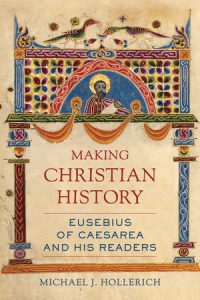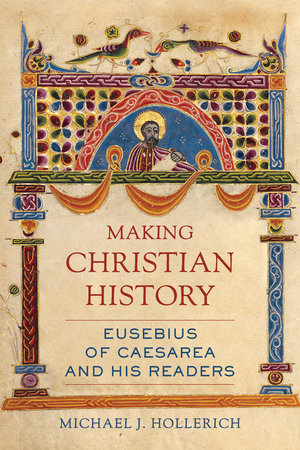Hollerich, Michael J. Making Christian History: Eusebius of Caesarea and His Readers. Oakland, California: University of California Press, 2021, pp. 316, $95.00, hardback.
Recent trends in early Christian studies have turned their attention toward questions of textuality: what does it mean to read a text, what choices informed an author’s inclusion or omission of details, and how has a text been received among its readers? Moreover, what does it mean to be a reader? These concerns rise to the surface rather quickly when engaging with Eusebius’s Ecclesiastical History. In Making Christian History, Michael Hollerich (Professor of Theology, University of St. Thomas) provides students of early Christian studies, patristics, and Christian historiography with a necessary ground-clearing of all things Ecclesiastical History—and, in doing so, makes a welcome contribution to the field writ large.
To be clear, Hollerich does not aim to provide commentary on Eusebius’s work itself; instead, Hollerich begins with the work’s composition and analyzes the ways it has been both received and reappropriated since. In other words, Hollerich’s interest lies primarily in the social and cultural impacts Eusebius’s work had rather than trying to dissect the contents within the work itself. This caveat noted, Hollerich provides a helpful introduction to the literary mode and intellectual place of Eusebius in his foundational chapter (particularly pp. 22–46). Following this, he dedicates chapters to the contexts of Ecclesiastical History’s reception history, including the context of the Christian Empire (pp. 47–87), the Non-Greek East (pp. 88–140), the Latin West (pp. 141–170), and Byzantium (pp. 171–190), while the penultimate chapter touches on the “rediscovery” of Ecclesiastical History in the Renaissance and Reformation eras (p. 237). The book concludes with an eye toward modernity and the future of Eusebian reception moving forward (pp. 238–273). The benefit of this structure lies in the reality that Hollerich leaves nearly no historical stone unturned, inviting more peripheral and neglected communities of literary production to the table. Hollerich’s work casts a wide net, and in doing so demonstrates precisely the same thing he reiterates from Emanuela Prinzivalli in the book’s final chapter: “We find it hard to imagine how western historiographical thought, and our knowledge of historical sources in Christianity’s first centuries, would have been possible without the Ecclesiastical History” (p. 268).
This arrangement, of course, is not above critique altogether. Moments wherein Hollerich’s analysis of Eusebian reception history feels as if it maintains a narrow window of application, intended only for those interested in the practice of Christian historiography. Those outside these immediate literary concerns may use Eusebius as a lens through which to read Christian history, and the reviewer wonders if synthesizing it for an only slightly broader audience may benefit the overall impact the work will have. (After all, surveying the whole of Christendom is quite the task.) Those readers conversant with notions of reading, reception, appropriation, and textuality in history may not encounter hiccups in the work, but those less familiar with these ideas might find the work a less fruitful endeavor overall due to these conceptual hurdles. Perhaps one final chapter reemphasizing those commonalities and distinguishing features of Eusebius’s reception throughout various contexts would aid in this regard, or perhaps mitigate the problem altogether.
On the other hand, the tenor of the present review seeks to be in large part one of commendation: Hollerich has an intimate knowledge of the literature, and his book is one of the rare works wherein the reader can sense the need for a lifetime of careful scholarship to germinate the ideas within it. Hollerich succeeds in carrying forward the torch of modern scholarship focused on Eusebius and his contributions to Christian identity and history. Additionally, Hollerich does an excellent job of bringing his survey of Eusebius’s reception history back into conversation with modern questions as he concludes the book, bringing up some of those less-immediately-textual concerns that permeate Eusebius today, such as Eusebius’s anti-Jewish apologetic, Origenism, and theo-political vision (pp. 269–273).
If it has not yet been made apparent, this work is recommended for those seeking to understand not merely what Eusebius sought to write or accomplish in Ecclesiastical History but also why it became as socially influential as it did. This reviewer was most enthralled with the first few chapters—which set the trajectory for the more specific contextual analyses that follow—along with the concluding chapter. While these chapters felt most rife with immediate theological investigation and application, Hollerich offers a valuable guide to the practice of studying Christian texts and their reception. In doing so, he provides students of early Christian studies, patristics, historiography, and historical theology with a worthy endeavor that demands careful reading—even if Eusebius himself does not come to bear on their research.
Cody Glen Barnhart
University of Aberdeen





